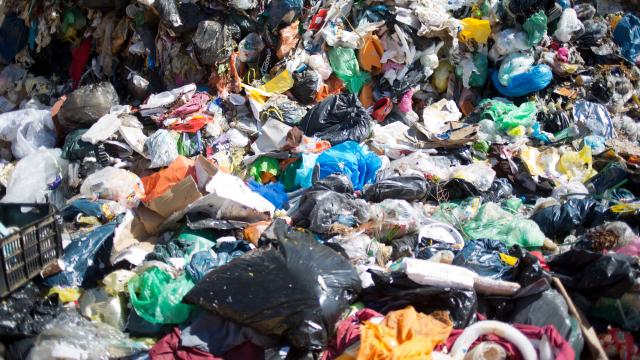Like other forms of discarded plastic, polyurethane waste threatens the environment and human health. In an encouraging new development, European scientists have stumbled upon a hardy strain of bacteria that appears to thrive off the stuff.
New research published in Frontiers in Microbiology describes a newly identified strain of soil bacterium that’s capable of breaking down the chemical bonds found in polyurethane. The new strain, called Pseudomonas sp. TDA1, was discovered by scientists visiting a garbage dump littered with brittle plastics.
It’ll be a while before we see this bacterium degrading quantities of discarded polyurethane en masse, but it’s an encouraging beginning. The new bacterium was analysed by researchers from the Helmholtz Centre for Environmental Research in Leipzig, Germany, and other institutions.
Polyurethane is used in fridges, furniture, tents, buildings, diapers, footwear, and anything else in which flexible, lightweight, and durable materials are required. Millions of tons of the stuff is produced each year, and in 2015 the polyurethane market in the U.S. was valued at $US12.09 ($20) billion.
Like other plastic waste, polyurethane takes a long time to degrade, and it’s very expensive to break down manually. It’s also hard to recycle because polyurethane doesn’t melt when heated. As a result, a lot of it ends up at garbage dumps, where it leaks toxins into the environment, including chemicals that are harmful to most microorganisms, not to mention carcinogens harmful to humans.
The newly identified microbe is a form of Pseudomonas, a group of bacteria known for their hardiness. Pseudomonas bacteria can withstand some very harsh conditions, such as acidic environments and high temperatures, which is why they’re considered extremophile organisms.
At the lab, the TDA1 strain of Pseudomonas was found to be capable of degrading the chemical building blocks of polyurethane. What’s more, the microorganisms were able to metabolize these compounds and use them for food. This results in a kind of feedback loop, in which the ongoing consumption of plastics further fuels the process.
“The bacteria can use these compounds as a sole source of carbon, nitrogen and energy,” said Hermann Heipieper, a co-author of the paper and a senior scientist at the Helmholtz Centre for Environmental Research-UFZ, in the press release. “This finding represents an important step in being able to reuse hard-to-recycle [polyurethane] products.”
Indeed, microbes are introducing exciting new possibilities in our struggle to reduce the horrific amounts of plastic waste that now litters our planet. This strategy is known as biorecycling, in which biological organisms, such as microbes, fungi, and even insects, are used to break down plastics.
It’s not the plastic-chomping organisms themselves that scientists care about, but rather the chemical processes they employ to get the job done. Once researchers have found solutions already devised by nature, they can then be synthesized in the lab. In essence, scientists aren’t looking to reinvent the wheel. Developing a method to then mass produce the stuff, however, presents another challenge entirely. It could be years before we see any sort of solution that can actually be deployed to the field.
In this case, the scientists are looking for the genes responsible for the production of extracellular enzymes—the types of proteins—that attack and degrade the plastic bonds. They’re also trying to figure out how Pseudomonas sp. TDA1 leverages this process to acquire its energy. The new study was a preliminary look into these facets, and future work will continue along these lines.
